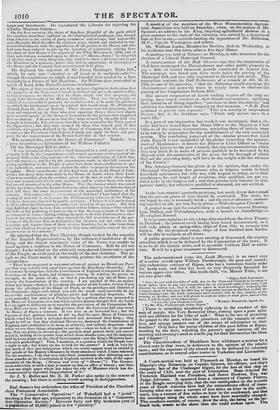a population of 21,000) joined in the "joviality." board tack,
nearer to the shore than she could reckon upon. changed.
traps and faleehoods. lie reprobated the Liberals fur rejecting Sir A meeting of the members of the West Worcestershire Agricul-
Charles Manners Sutton— tural Association was held on Saturday ; when, on the motion of Mr. On the first occasion, the choice of Speaker, forgetful of the pain which Spooner, an address to the King, imputing agricultural distress in a his rejection must have inflicted on the distinguished gentleman who, though great measure to the state of the currency, was carried by a majority of then selected as the victim ofparty inaumuvre and revenge, had honourably four or five to one,—notwithstanding the opposition of Mr. Robinson, and efficiently tilled the office for eighteen years, elected and reelected in sue- M. P., Captain Wilmington, and others.
Mr. Wadham Locke, Member for Devizes, died on Wednesday, at
their solicitations consented again to fill it—(" Shame, shame ! ")—forgetful A meeting was held at Totness on Monday, to take measures for the of all this, and of every Wag else, they wished to force a division, and to put election of a Liberal Municipal Council. the Ministers in a minority, before they had an opportuuity of developing to A correspondent of the Mil Observer says that the corporation of the House and the Country their measures and their plans. a Hull have mortgaged the Mansionhouse and other public property to He deplored the rejection of Sir Henry Hardinge's Tithe Bill; pay a debt of several thousand pounds contracted in August last. which, he said, was "admitted on all hands to be unabjectionable,"— The mortgage was dated just three weeks before the passing of the though the resolutions on which it was founded were carried by a bare Municipal Bill, and was only registered at Beverley last week. This majority in a House of 420 Members. Sir William then proceeded to transaction reminds the Hull Reformers of a remark of Mr. M. D. speak of Lord John Russell's famous resolution— !fill, in one of his speeches, " that the Aldermen would mortgage the The object of that resolution was this—to have a legislative declaration that Alansionhouse and pawn the mace to supply funds to obstruct the the property of the Prote.tant Church in Ireland was not to be sacred to Pro- passing of the Corporation Reform Bill." testant purposes—to declare that the State might take that property, and The ancient corporation of Leeds wishing to pass off the stage re- apply it for the benefit qt. the Roman Catholics. That was the principle on ng, bare issued circulars to their friends and retainers, signifying
their intention of dining together, " previous to their dissolution," and
Church front the flee of Ireland. These dangers were not imaginary, they soliciting the honour of their company on that occasion. " N.i3 were not conjured up by those who were opposing them ; these very objects gentleman to pay his own expenses." This is a novelty in
corporation
were avowed openly in the House of Commons by the persons who supported dinners ; but, as the Irishman says, " Death only occurs once in a that resolution. 1 do not mean that they were avowed by the noble lord who man's life." brought it lanyard; I do not mean that they were sugared by the Whig part of In a part of our impression last week it was mentioned, that a cir. the Opposition ; but they were avowed by those who formed part of that cuter had been issued from the Home Office to the Mayors or Chief coalition, who openly declared in the House of Commons, that the object was Officers of the various Corporations, reminding them of certain steps to remove the Protestant Church from Ireland, and apply its funds and pro- to be taken in preparation for the establishment of the new municipal party for the maintenance of the Boman Catholics in that country. system. The concluding paragraph of the circular proves that Lord Who avowed this, and in the House of Cominons? Nobody : it is John Russell is not unmindful of his pledge respecting the appoint-
a pure invention—a fabrication of Sir William Follett's. ment of Magistrates : it directs the Mayor or Chief Officer to " make
• Of the Municipal Bill he said— it publicly known to the new Council, that any recommendation which " It was introchwed either with a total disregard or a total ignorance of the they may think tit to make of persons qualified to be intrusted by his property held by the Corporations—with a total ignorance or disregard of the Alajesty with the commission of the peace for the borough of which property held under Corporations—of the charities and livings of which they
they are the governing body, will have its due weight with the advisers


























 Previous page
Previous page